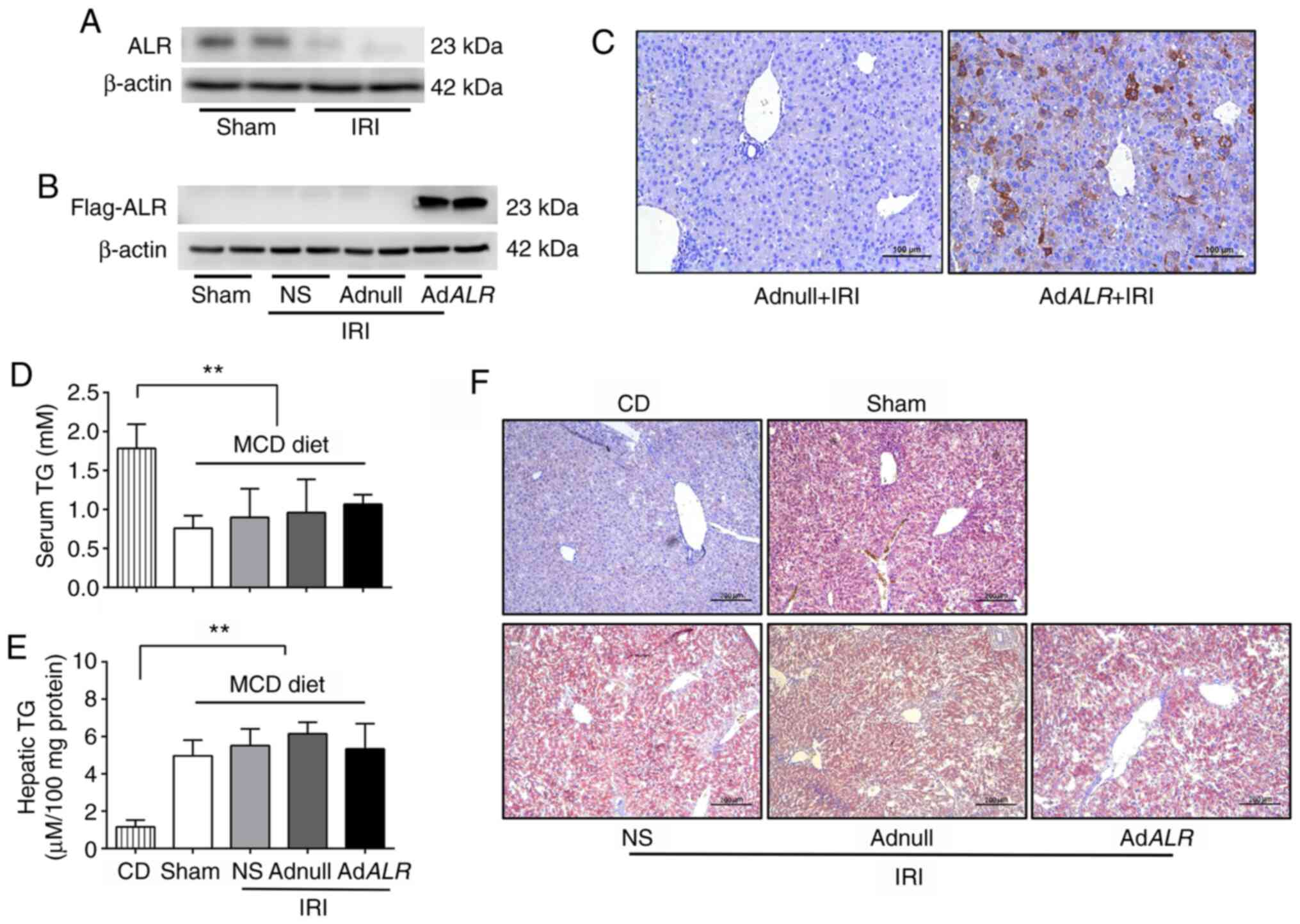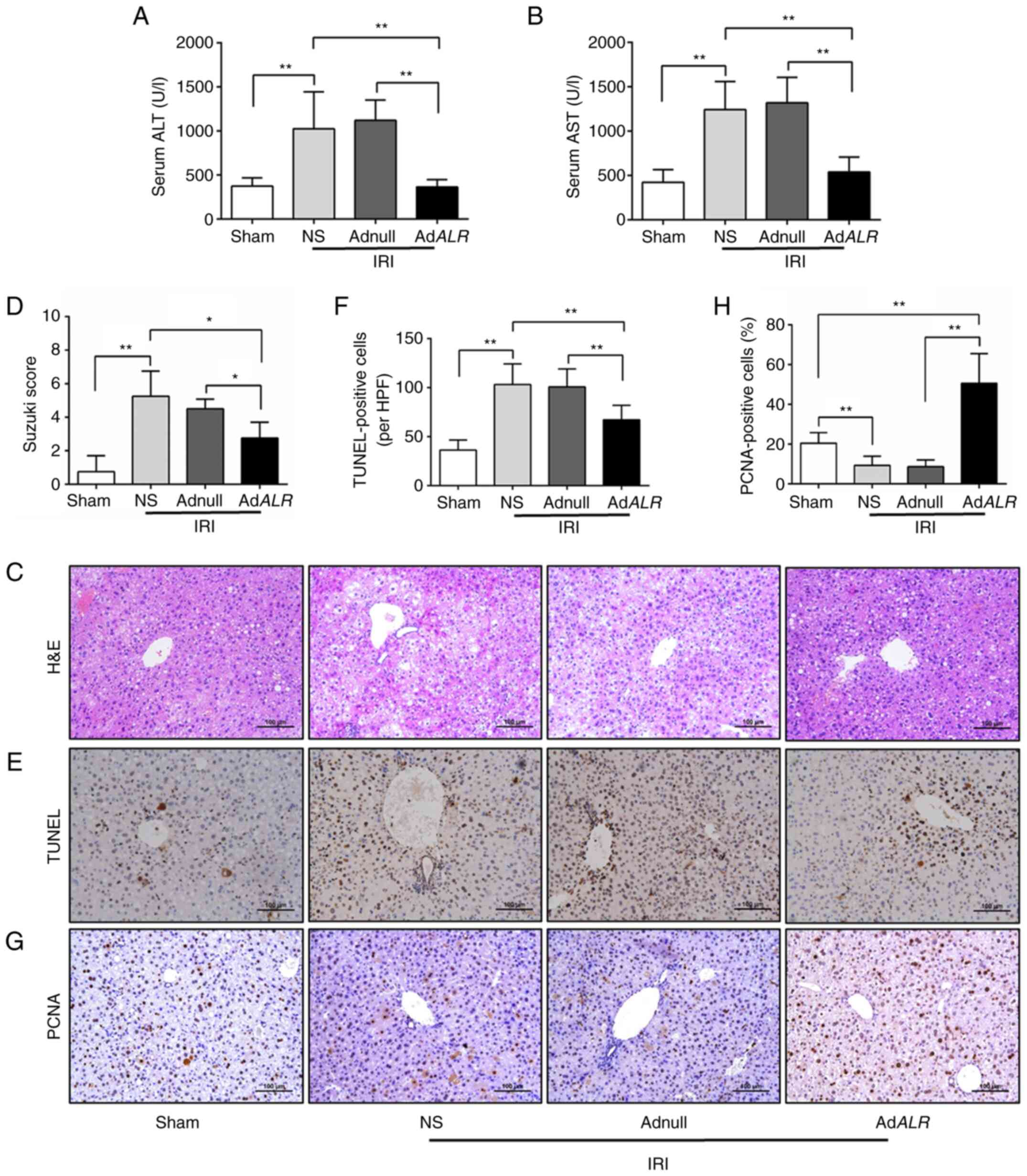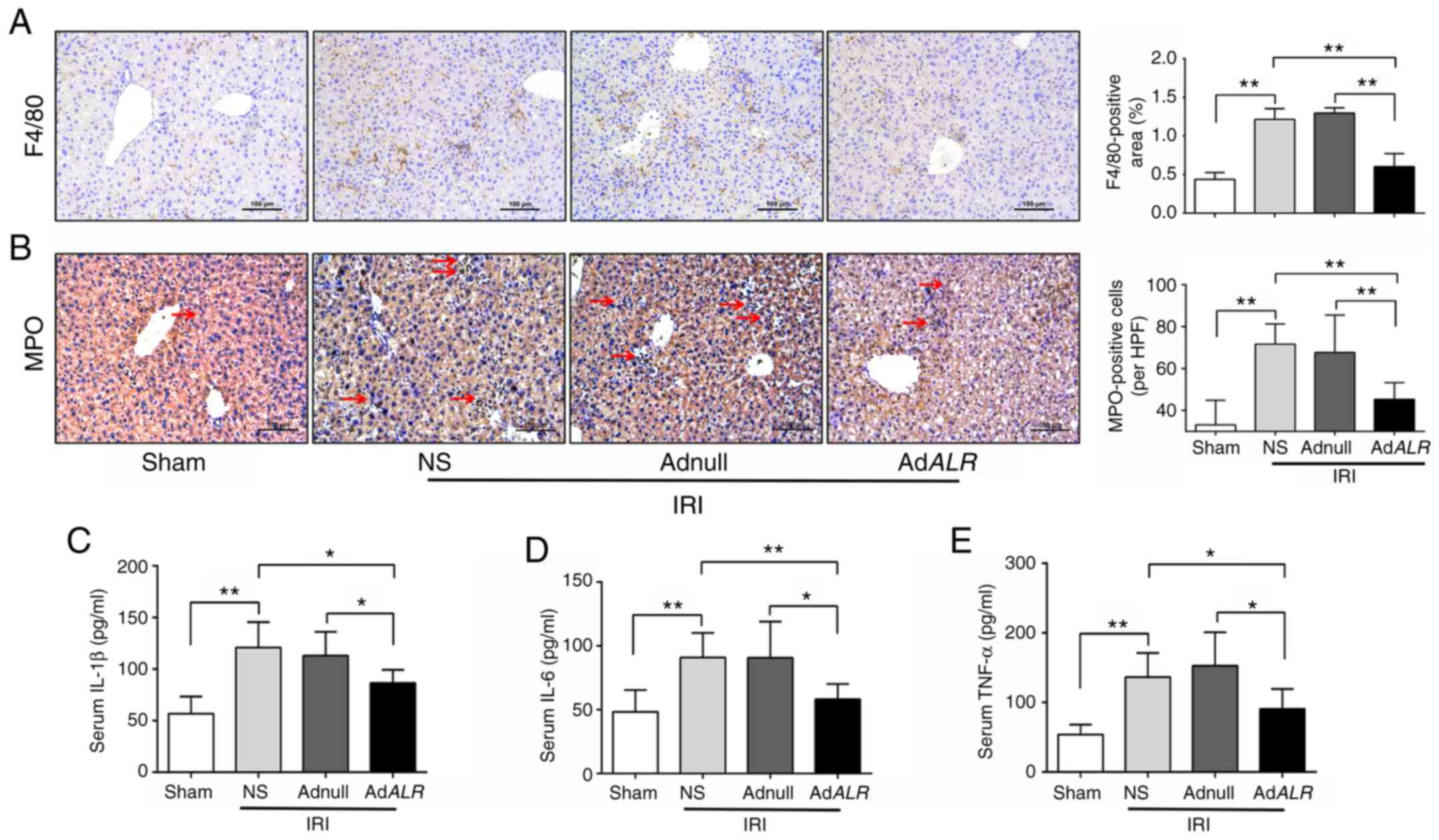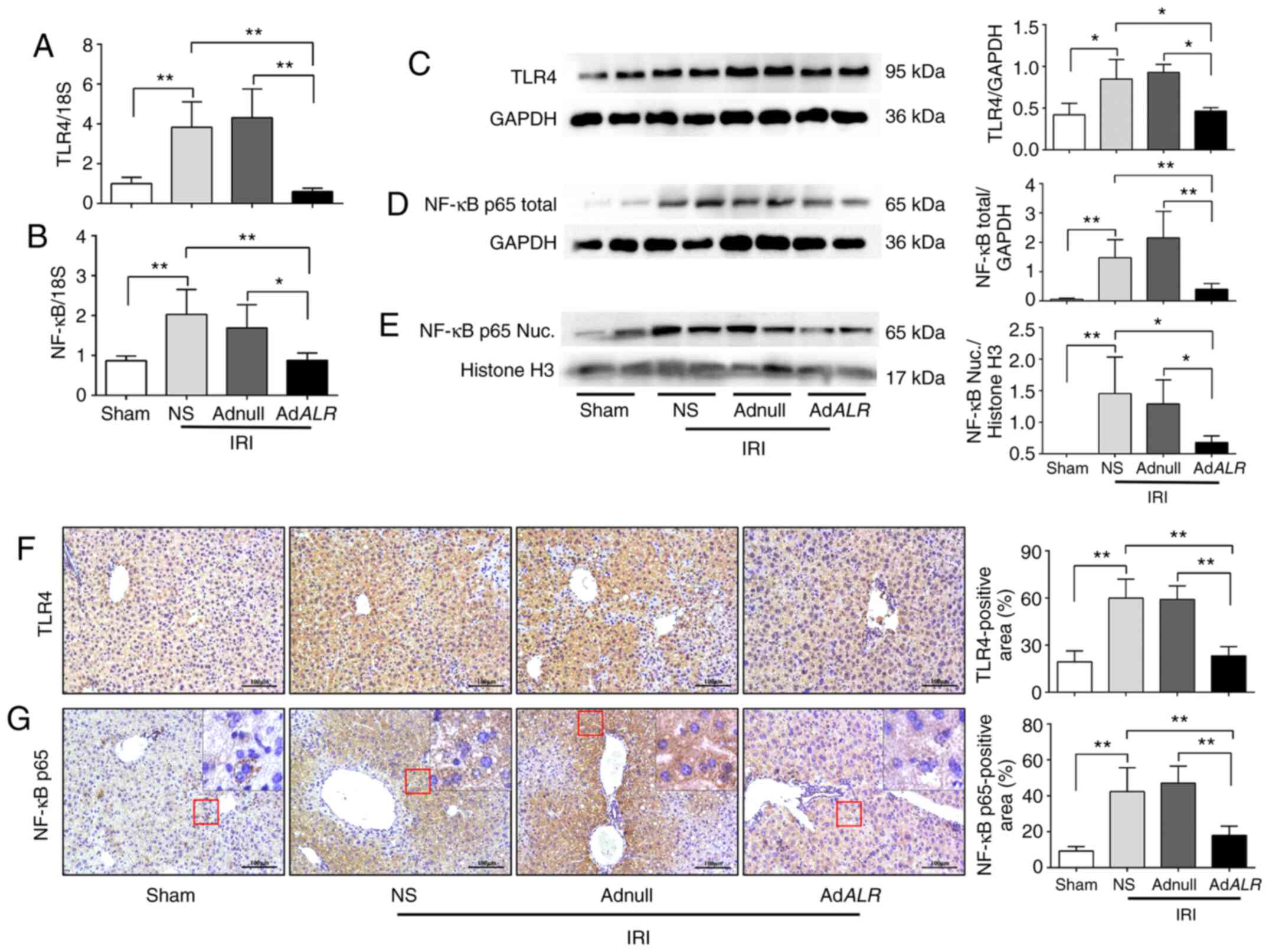|
1
|
Fondevila C, Busuttil RW and
Kupiec-Weglinski JW: Hepatic ischemia/reperfusion injury--a fresh
look. Exp Mol Pathol. 74:86–93. 2003.PubMed/NCBI View Article : Google Scholar
|
|
2
|
Zhai Y, Petrowsky H, Hong JC, Busuttil RW
and Kupiec-Weglinski JW: Ischaemia-reperfusion injury in liver
transplantation - from bench to bedside. Nat Rev Gastroenterol
Hepatol. 10:79–89. 2013.PubMed/NCBI View Article : Google Scholar
|
|
3
|
Bzowej NH: Nonalcoholic steatohepatitis:
The new frontier for liver transplantation. Curr Opin Organ
Transplant. 23:169–174. 2018.PubMed/NCBI View Article : Google Scholar
|
|
4
|
Besutti G, Valenti L, Ligabue G, Bassi MC,
Pattacini P, Guaraldi G and Giorgi Rossi P: Accuracy of imaging
methods for steatohepatitis diagnosis in non-alcoholic fatty liver
disease patients: A systematic review. Liver Int. 39:1521–1534.
2019.PubMed/NCBI View Article : Google Scholar
|
|
5
|
Tashiro H, Kuroda S, Mikuriya Y and Ohdan
H: Ischemia-reperfusion injury in patients with fatty liver and the
clinical impact of steatotic liver on hepatic surgery. Surg Today.
44:1611–1625. 2014.PubMed/NCBI View Article : Google Scholar
|
|
6
|
Maurice J and Manousou P: Non-alcoholic
fatty liver disease. Clin Med (Lond). 18:245–250. 2018.PubMed/NCBI View Article : Google Scholar
|
|
7
|
Jiménez-Castro MB, Meroño N, Mendes-Braz
M, Gracia-Sancho J, Martínez-Carreres L, Cornide-Petronio ME,
Casillas-Ramirez A, Rodés J and Peralta C: The effect of brain
death in rat steatotic and non-steatotic liver transplantation with
previous ischemic preconditioning. J Hepatol. 62:83–91.
2015.PubMed/NCBI View Article : Google Scholar
|
|
8
|
Kubes P and Mehal WZ: Sterile inflammation
in the liver. Gastroenterology. 143:1158–1172. 2012.PubMed/NCBI View Article : Google Scholar
|
|
9
|
Yang F, Shang L, Wang S, Liu Y, Ren H, Zhu
W and Shi X: TNFα-mediated necroptosis aggravates
ischemia-reperfusion injury in the fatty liver by regulating the
inflammatory response. Oxid Med Cell Longev.
2019(2301903)2019.PubMed/NCBI View Article : Google Scholar
|
|
10
|
Li Y, Ma D, Wang Z and Yang J:
MicroRNA-155 deficiency in Kupffer cells ameliorates liver
ischemia-reperfusion injury in mice. Transplantation.
101:1600–1608. 2017.PubMed/NCBI View Article : Google Scholar
|
|
11
|
Schwabe RF, Seki E and Brenner DA:
Toll-like receptor signaling in the liver. Gastroenterology.
130:1886–1900. 2006.PubMed/NCBI View Article : Google Scholar
|
|
12
|
Rao J, Qian X, Li G, Pan X, Zhang C, Zhang
F, Zhai Y, Wang X and Lu L: ATF3-mediated NRF2/HO-1 signaling
regulates TLR4 innate immune responses in mouse liver
ischemia/reperfusion injury. Am J Transplant. 15:76–87.
2015.PubMed/NCBI View Article : Google Scholar
|
|
13
|
Zhai Y, Busuttil RW and Kupiec-Weglinski
JW: Liver ischemia and reperfusion injury: New insights into
mechanisms of innate-adaptive immune-mediated tissue inflammation.
Am J Transplant. 11:1563–1569. 2011.PubMed/NCBI View Article : Google Scholar
|
|
14
|
Lv YN, Ou-Yang AJ and Fu LS: MicroRNA-27a
negatively modulates the inflammatory response in
lipopolysaccharide-stimulated microglia by targeting TLR4 and
IRAK4. Cell Mol Neurobiol. 37:195–210. 2017.PubMed/NCBI View Article : Google Scholar
|
|
15
|
Jiang X, Kuang G, Gong X, Jiang R, Xie T,
Tie H, Wu S, Wang T, Wan J and Wang B: Glycyrrhetinic acid
pretreatment attenuates liver ischemia/reperfusion injury via
inhibiting TLR4 signaling cascade in mice. Int Immunopharmacol.
76(105870)2019.PubMed/NCBI View Article : Google Scholar
|
|
16
|
LaBrecque DR and Pesch LA: Preparation and
partial characterization of hepatic regenerative stimulator
substance (SS) from rat liver. J Physiol. 248:273–284.
1975.PubMed/NCBI View Article : Google Scholar
|
|
17
|
Zhang J, Li Y, Jiang S, Yu H and An W:
Enhanced endoplasmic reticulum SERCA activity by overexpression of
hepatic stimulator substance gene prevents hepatic cells from ER
stress-induced apoptosis. Am J Physiol Cell Physiol. 306:C279–C290.
2014.PubMed/NCBI View Article : Google Scholar
|
|
18
|
Thirunavukkarasu C, Wang LF, Harvey SA,
Watkins SC, Chaillet JR, Prelich J, Starzl TE and Gandhi CR:
Augmenter of liver regeneration: An important intracellular
survival factor for hepatocytes. J Hepatol. 48:578–588.
2008.PubMed/NCBI View Article : Google Scholar
|
|
19
|
Khandoga A, Mende K, Iskandarov E,
Rosentreter D, Schelcher C, Reifart J, Jauch KW and Thasler WE:
Augmenter of liver regeneration attenuates inflammatory response in
the postischemic mouse liver in vivo. J Surg Res. 192:187–194.
2014.PubMed/NCBI View Article : Google Scholar
|
|
20
|
Care NRCU, Animals AUOL: Guide for the
Care and Use of Laboratory Animals. National Academies Press,
Washington, DC, 2011.
|
|
21
|
Weng J, Li W, Jia X and An W: Alleviation
of Ischemia-Reperfusion Injury in Liver Steatosis by Augmenter of
Liver Regeneration Is Attributed to Antioxidation and Preservation
of Mitochondria. Transplantation. 101:2340–2348. 2017.PubMed/NCBI View Article : Google Scholar
|
|
22
|
Olthof PB, van Golen RF, Meijer B, van
Beek AA, Bennink RJ, Verheij J, van Gulik TM and Heger M: Warm
ischemia time-dependent variation in liver damage, inflammation,
and function in hepatic ischemia/reperfusion injury. Biochim
Biophys Acta Mol Basis Dis. 1863:375–385. 2017.PubMed/NCBI View Article : Google Scholar
|
|
23
|
Suzuki S, Toledo-Pereyra LH, Rodriguez FJ
and Cejalvo D: Neutrophil infiltration as an important factor in
liver ischemia and reperfusion injury. Modulating effects of FK506
and cyclosporine. Transplantation. 55:1265–1272. 1993.PubMed/NCBI View Article : Google Scholar
|
|
24
|
Livak KJ and Schmittgen TD: Analysis of
relative gene expression data using real-time quantitative PCR and
the 2(-Delta Delta C(T)) method. Methods. 25:402–408.
2001.PubMed/NCBI View Article : Google Scholar
|
|
25
|
van der Veen BS, de Winther MP and
Heeringa P: Myeloperoxidase: Molecular mechanisms of action and
their relevance to human health and disease. Antioxid Redox Signal.
11:2899–2937. 2009.PubMed/NCBI View Article : Google Scholar
|
|
26
|
Colletti LM, Kunkel SL, Walz A, Burdick
MD, Kunkel RG, Wilke CA and Strieter RM: The role of cytokine
networks in the local liver injury following hepatic
ischemia/reperfusion in the rat. Hepatology. 23:506–514.
1996.PubMed/NCBI View Article : Google Scholar
|
|
27
|
Nace GW, Huang H, Klune JR, Eid RE,
Rosborough BR, Korff S, Li S, Shapiro RA, Stolz DB, Sodhi CP, et
al: Cellular-specific role of toll-like receptor 4 in hepatic
ischemia-reperfusion injury in mice. Hepatology. 58:374–387.
2013.PubMed/NCBI View Article : Google Scholar
|
|
28
|
Liu L, Xie P, Li W, Wu Y and An W:
Augmenter of liver regeneration protects against ethanol-induced
acute liver injury by promoting autophagy. Am J Pathol.
189:552–567. 2019.PubMed/NCBI View Article : Google Scholar
|
|
29
|
Maehara Y and Fernandez-Checa JC:
Augmenter of liver regeneration links mitochondrial function to
steatohepatitis and hepatocellular carcinoma. Gastroenterology.
148:285–288. 2015.PubMed/NCBI View Article : Google Scholar
|
|
30
|
Kumar S, Verma AK, Rani R, Sharma A, Wang
J, Shah SA, Behari J, Salazar Gonzalez R, Kohli R and Gandhi CR:
Hepatic deficiency of augmenter of liver regeneration predisposes
to nonalcoholic steatohepatitis and fibrosis. Hepatology.
72:1586–1604. 2020.PubMed/NCBI View Article : Google Scholar
|
|
31
|
Nakamura K, Zhang M, Kageyama S, Ke B,
Fujii T, Sosa RA, Reed EF, Datta N, Zarrinpar A, Busuttil RW, et
al: Macrophage heme oxygenase-1-SIRT1-p53 axis regulates sterile
inflammation in liver ischemia-reperfusion injury. J Hepatol.
67:1232–1242. 2017.PubMed/NCBI View Article : Google Scholar
|
|
32
|
Jimenez-Castro MB, Cornide-Petronio ME,
Gracia-Sancho J and Peralta C: Inflammasome-mediated inflammation
in liver ischemia-reperfusion injury. Cells. 8(1131)2019.PubMed/NCBI View Article : Google Scholar
|
|
33
|
Nakamura K, Zhang M, Kageyama S, Ke B,
Fujii T, Sosa RA, Reed EF, Datta N, Zarrinpar A, Busuttil RW, et
al: Macrophage heme oxygenase-1-SIRT1-p53 axis regulates sterile
inflammation in liver ischemia-reperfusion injury. J Hepatol.
67:1232–1242. 2017.PubMed/NCBI View Article : Google Scholar
|
|
34
|
Motiño O, Francés DE, Casanova N,
Fuertes-Agudo M, Cucarella C, Flores JM, Vallejo-Cremades MT,
Olmedilla L, Pérez Peña J, Bañares R, et al: Protective role of
hepatocyte cyclooxygenase-2 expression against liver
ischemia-reperfusion injury in mice. Hepatology. 70:650–665.
2019.PubMed/NCBI View Article : Google Scholar
|
|
35
|
Ben-Ari Z, Avlas O, Fallach R,
Schmilovitz-Weiss H, Chepurko Y, Pappo O and Hochhauser E: Ischemia
and reperfusion liver injury is reduced in the absence of Toll-like
receptor 4. Cell Physiol Biochem. 30:489–498. 2012.PubMed/NCBI View Article : Google Scholar
|
|
36
|
Shen XD, Ke B, Zhai Y, Gao F, Tsuchihashi
S, Lassman CR, Busuttil RW and Kupiec-Weglinski JW: Absence of
toll-like receptor 4 (TLR4) signaling in the donor organ reduces
ischemia and reperfusion injury in a murine liver transplantation
model. Liver Transpl. 13:1435–1443. 2007.PubMed/NCBI View Article : Google Scholar
|
|
37
|
Li X: IRAK4 in TLR/IL-1R signaling:
Possible clinical applications. Eur J Immunol. 38:614–618.
2008.PubMed/NCBI View Article : Google Scholar
|
|
38
|
Jiang N, Zhang X, Zheng X, Chen D, Zhang
Y, Siu LK, Xin HB, Li R, Zhao H, Riordan N, et al: Targeted gene
silencing of TLR4 using liposomal nanoparticles for preventing
liver ischemia reperfusion injury. Am J Transplant. 11:1835–1844.
2011.PubMed/NCBI View Article : Google Scholar
|
|
39
|
Yan R, Li Y, Zhang L, Xia N, Liu Q, Sun H
and Guo H: Augmenter of liver regeneration attenuates inflammation
of renal ischemia/reperfusion injury through the NF-kappa B pathway
in rats. Int Urol Nephrol. 47:861–868. 2015.PubMed/NCBI View Article : Google Scholar
|
|
40
|
Pan LF, Yu L, Wang LM, He JT, Sun JL, Wang
XB, Wang H, Bai ZH, Feng H and Pei HH: Augmenter of liver
regeneration (ALR) regulates acute pancreatitis via inhibiting
HMGB1/TLR4/NF-κB signaling pathway. Am J Transl Res. 10:402–410.
2018.PubMed/NCBI
|


















